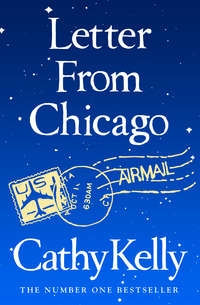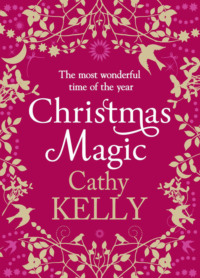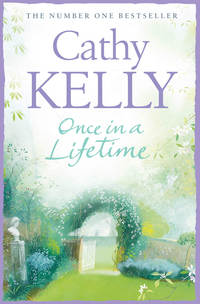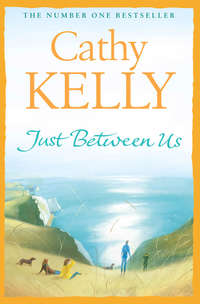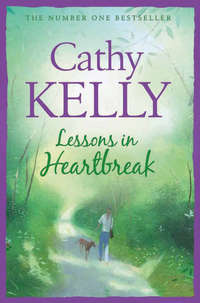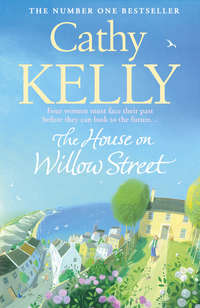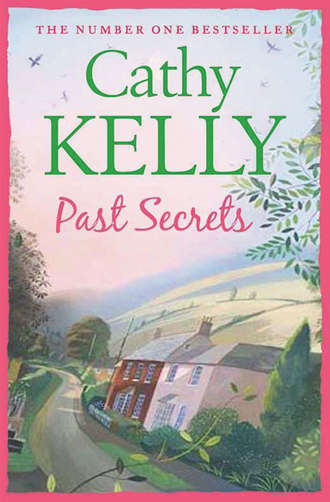
Полная версия
Past Secrets

Past Secrets
Cathy Kelly


Copyright
This novel is entirely a work of fiction. The names, characters and incidents portrayed in it are the work of the author’s imagination. Any resemblance to actual persons, living or dead, events or localities is entirely coincidental.
Published by HarperCollinsPublishers Ltd 1 London Bridge Street London SE1 9GF
www.harpercollins.co.uk
Copyright © Cathy Kelly 2006
Cathy Kelly asserts the moral right to be identified as the author of this work
A catalogue record for this book is available from the British Library
All rights reserved under International and Pan-American Copyright Conventions. By payment of the required fees, you have been granted the non-exclusive, non-transferable right to access and read the text of this e-book on screen. No part of this text may be reproduced, transmitted, downloaded, decompiled, reverse engineered, or stored in or introduced into any information storage and retrieval system, in any form or by any means, whether electronic or mechanical, now known or hereinafter invented, without the express written permission of HarperCollins e-books.
HarperCollinsPublishers has made every reasonable effort to ensure that any picture content and written content in this ebook has been included or removed in accordance with the contractual and technological constraints in operation at the time of publication.
Source ISBN: 9780007268658
Ebook Edition © February 2012 ISBN: 9780007389353
Version: 2017-10-28
Praise
Praise for Cathy Kelly:
‘A tear-pricking writer, capable of making you care about her characters.’
Daily Mail
‘Totally believable.’
Rosamunde Pilcher
‘An upbeat and diverting tale skilfully told…Kelly knows what her readers want and consistently delivers.’
Sunday Independent
‘Warm and delightful.’
New Woman
‘An absorbing, heart-warming tale.’
Company
‘Her skill at dealing with the complexities of modern life, marriage and families is put to good effect as she teases out the secrets of her characters.’
Choice
‘Kelly dramatises her story with plenty of sparky humour.’
The Times
‘Kelly has an admirable capacity to make the readers identify, in turn, with each of her female characters…’
Irish Independent
For Laura, Naomi and Emer
Table of Contents
Cover Page
Title Page
Copyright
Praise
Dedication
CHAPTER ONE
CHAPTER TWO
CHAPTER THREE
CHAPTER FOUR
CHAPTER FIVE
CHAPTER SIX
CHAPTER SEVEN
CHAPTER EIGHT
CHAPTER NINE
CHAPTER TEN
CHAPTER ELEVEN
CHAPTER TWELVE
CHAPTER THIRTEEN
CHAPTER FOURTEEN
CHAPTER FIFTEEN
CHAPTER SIXTEEN
CHAPTER SEVENTEEN
CHAPTER EIGHTEEN
CHAPTER NINETEEN
CHAPTER TWENTY
CHAPTER TWENTY-ONE
CHAPTER TWENTY-TWO
CHAPTER TWENTY-THREE
CHAPTER TWENTY-FOUR
CHAPTER TWENTY-FIVE
CHAPTER TWENTY-SIX
CHAPTER TWENTY-SEVEN
CHAPTER TWENTY-EIGHT
CHAPTER TWENTY-NINE
CHAPTER THIRTY
Keep Reading
Acknowledgements
Excerpt from The House on Willow Street
Prologue
Chapter One
About the Author
By the same author
About the Publisher
CHAPTER ONE
If a road could look welcoming, then Summer Street had both arms out and the kettle boiling.
Christie Devlin had lived halfway up the street for exactly thirty years in a small but exquisite red-bricked house that gleamed like a jewel in a necklace of pretty coloured stones.
Summer Street itself was curved and ran for half a mile from the crossroads where the café sat opposite a house which had once been a strawberry-ice-cream shade and was now a faded dusky pink.
From the moment Christie had seen the graceful curve of the street, where maple trees arched like kindly aunties over the pavement, she’d known: this was the place she and James could raise their family.
Those thirty years had gone in a flash, Christie thought on this beautiful late-April morning as she went about her chores, tidying, dusting, sweeping and wiping.
Today the sun streamed in through the windows, the house seemed filled with quiet contentment and Christie didn’t have to go to work. She loved her job as an art teacher at St Ursula’s secondary school, but she’d cut back her hours recently and was relishing the extra free time.
Her dogs, Tilly and Rocket, miniature dachshunds who had clearly been imperial majesties in a previous life, were sleeping off their morning walk on the cool of the kitchen tiles. The radio was playing quietly in the background and the old steel percolator was making the rattling death throes that signalled the coffee was nearly ready. All should have been right with Christie’s world.
And it was – except for a niggling feeling of disquiet. It had been simmering in her subconscious since she’d awoken at six to the joyous chorus of birdsong outside her bedroom window.
‘Happy Anniversary,’ James had murmured sleepily when the alarm went off at a quarter past and he rolled over in the bed to cuddle her, to find Tilly squashed between them. The dogs were supposed to sleep on their corduroy bean-bags on the floor, but Tilly adored the comfortable little hollow in the duvet between her master and mistress. James lifted the outraged dog and settled her at his other side, then moved closer to Christie. ‘Thirty years today since we moved in. And I still haven’t finished flooring the attic.’
Christie, wide awake and grappling with the intense feeling that something, somewhere, was wrong, had to laugh. Everything was so normal. She must be imagining the gloom.
‘I expect the floor to be finished this weekend,’ she said in the voice that could still the most unruly class in St Ursula’s. Not that she had ever had much trouble with unruly students. Christie’s love of art was magical and intense, and transferred itself to most of her pupils.
‘Please, no, Mrs Devlin,’ begged James, in mock-schoolboy tones. ‘I don’t have the energy. Besides, the dog keeps eating my homework.’
Panting, Tilly clambered back defiantly and tried to make her cosy nest in between them again.
‘The dog would definitely eat the homework in this house,’ James added.
Christie took hold of Tilly’s warm velvety body and cuddled her, crooning softly.
‘I think you love those dogs more than you love the rest of us,’ he teased.
‘Of course I do,’ she teased back. Christie had seen him talking adoringly to Tilly and Rocket when he didn’t think anyone noticed. James was tall, manly and had a heart as soft as butter.
‘Children grow up and don’t want cuddles, but dogs are puppies for ever,’ she added, tickling Tilly gently in her furry armpits. ‘And let’s face it, you don’t run around my feet yelping with delight when I get home from work, do you?’
‘I never knew that’s what you wanted.’ He made a few exploratory barking noises. ‘If I do, will you whisper sweet nothings to me?’ Christie looked at her husband. His hair was no longer a blond thatch. It was sandy grey and thinning, and he had as many fine lines around his face as she had, but James could still make Christie smile on the inside.
‘I might,’ she said.
From the bedroom floor, Rocket whimpered, wanting to be included in the fun.
James got out of bed and scooped her on to the duvet beside her mistress, whereupon Rocket began to smother Christie in kisses.
‘I hope I get to come back as one of your dogs in my next life,’ he remarked, heading to the bathroom for his shower.
Christie shivered. ‘Don’t even speak like that,’ she said, but she was talking to a closed door.
Thirty years in this house. How had the time passed so quickly?
‘I love it,’ she’d told James that first day, as she stood, pregnant with their second child, Shane, outside number 34, a house they could only afford because it required what the estate agent hilariously described as ‘a wee bit of renovating’.
‘You’re sure you don’t prefer the mock-Tudor heap seven streets over?’ asked James, holding tightly to little Ethan’s hand. At the grand old age of three and a quarter, Ethan’s current favourite hobbies included trampolining on his bed and wriggling out of his parents’ grasp to fling himself in danger’s path.
Christie had arched a dark eyebrow at her husband.
The heap’s front garden had been tarmacked while the back garden contained two fierce dogs who hadn’t responded when Christie instinctively reached out her hand. There was a sinister brick-sized hole in one of the upstairs windows and when James had casually asked the estate agent why there was no gun turret complete with AK47 peeking out, Christie had had to smother her laughter.
‘Call me old-fashioned,’ she told James, ‘but I somehow prefer Summer Street and this house.’
Despite the obvious dilapidation, the very bricks of number 34 seemed to glow with warmth, and the stained-glass oriel window over the graceful arched porch was in its original condition.
From where they stood, the Devlin family could see the Summer Street Café with its aqua-and-white-striped awning and paintwork. On the pavement outside stood white bistro chairs and three small tables covered with flowered sea-blue tablecloths that looked as if they’d been transported from a Sorrento balcony.
On the same side of the street as the café there were terraced houses; then a couple of slender detached houses squeezed in; eight small railway cottages, their classic fascia boards traced with delicate carvings; then a series of redbricks including theirs; five 1930s bungalows and, finally, a handful of one-storey-over-basements. The other side of Summer Street was lined with more terraced houses and cottages, along with a tiny park: two neatly kept acres with a colonnaded bandstand, an old railway pavilion and a minuscule fountain much loved by the pigeons who couldn’t bear to poop anywhere else.
The maple trees that lined the street were flanked by colourful border plants, while even the doors to the dizzying variety of houses were painted strong bright shades: cerulean blues, poinsettia scarlets, honeyed ambers.
Christie would always remember how James had responded when she’d said she loved the house. He’d put the hand that wasn’t holding on to Ethan around hers and squeezed.
‘Then we’ve got to have it,’ he’d said.
They hadn’t even looked inside.
When Christie told astonished people afterwards that they’d decided to buy 34 Summer Street without crossing the threshold, she’d explained that you knew when you were in the right place. Homes were about more than actual walls.
‘You can’t go far wrong with a well-built redbrick,’ James’s brother said sagely, put out by all this talk of feelings.
And indeed, the house was beautifully proportioned even though it was sadly down at heel, like a genteel lady who’d fallen on hard times but still polished the doorstep every morning even when she could barely afford milk for her tea.
But James and Christie knew it was more than decent proportions or the welcoming width of the copper-coloured front door that had made up their mind. Christie had simply known it was the home for them and James had learned to trust his wife’s instincts.
When she, James and Ethan moved in a month later, they were the proud owners of a ramshackle four-bedroom pile with one bathroom, nothing resembling a usable kitchen and a butterfly sanctuary for a garden.
In those days, there was no three-storey apartment block at the bottom of the street and no unneighbourly huffing about parking since most families were lucky to own just one car. But it was also before the park was given the primary-coloured playground equipment where small children roared with both delight and temper, depending on how the arguments were going over whose go it was on the slide.
Christie used to take Ethan and Shane to the park to play. Now, she walked Rocket and Tilly along the neatly trimmed pathways. Her two beautiful granddaughters, Sasha and Fifi, had been wheeled into the park in their buggies, and Sasha, now two and a half, loved hurling herself at the fountain as if she was about to leap in. Just like her dad, Christie thought fondly.
Ethan had always had so much energy. He’d thrown himself into life at full tilt from his very first breath. And he’d adored Summer Street.
‘We’d better get the mower out,’ James had observed that first day as Ethan ran into the garden, whooping with excitement, his blond head almost disappearing in the long, wild grass. The van they had rented to move their belongings was parked on the drive and a few friends were due round to help shift all the heavy stuff. But for the moment, the small family were alone. ‘It’s like a jungle out there.’
‘It’s like a jungle in here too,’ Christie had said wryly, looking up at the corner of the kitchen where a particularly murky black bit of wall stood out amid the peeling cat-sick-yellow plaster. ‘Please tell me there wasn’t that much mould on the walls when we viewed. We should have got the infectious diseases people to survey the house instead of an architect.’
‘You think we’ll be eaten in our beds by a noxious house fungus?’
Christie smiled affectionately at her husband, who’d given their son both his blond hair and sunny disposition. The pride of finally owning their own house shone in James’s eyes, noxious fungus notwithstanding.
‘Probably. Now, are you going to rescue Ethan, or am I to shift my five-months-pregnant bulk out after him?’ Tall and normally slender, she’d carried Ethan easily with a neat little basketball of a bump that was unnoticeable from behind. This time round, her slender figure was a distant memory and she felt like a giant stretch-marked pudding, equally enormous whichever angle she was viewed from.
Her sister Ana reckoned it was second baby syndrome, where all the muscles gave up the ghost. But Christie knew that her inexplicable cravings for huge bowls of deep-fried banana with ice cream hadn’t helped.
‘I’ll go and rescue him, o Massive One,’ James said, laying a hand on her swollen belly. ‘I don’t want you so tired out that you don’t have the energy to christen the house with me tonight.’ He grinned suggestively.
A laugh exploded out of Christie. The exhaustion of pregnancy meant she was asleep by nine most nights and not even a vat of aphrodisiacs could rouse her. But then she relented, seeing the look of hope on her husband’s face.
‘Back massage first,’ she bargained. Why her back should be an erogenous zone, Christie didn’t know. But feeling James’s supple hands kneading away her aches always got her in the mood for love.
‘Deal.’
The upside of living in such a wreck of a house was that Christie didn’t have to worry about Ethan crayoning on the walls, though he was an intrepid mountaineer so she spent much of her time rescuing him from various pieces of the second-hand furniture which was all they could afford. The downside of the house was that it seemed to take for ever before the damp was banished and they could eat a meal without a bit of ceiling falling on to their plates.
Now, a lifetime later, Ethan was thirty-three, Shane was almost thirty and Christie was a grandmother twice over.
The long dark hair she’d worn in a loose ponytail all those years ago was now cut to jaw length and waved, its cool silvery white highlighting the warmth of her olive skin and dark, winged eyebrows.
She still wore a delicate flick of eyeliner, which gave her eyes a magical tilt at each olive green corner, but had swapped the block of cake eyeliner she’d grown up with for a modern miracle liner pen. She liked embracing new things, believing that living too much in the past made a person look their age.
The kitchen wasn’t showing its age, either. Currently on its third incarnation, it had been decorated in brightly coloured chic, then antique pine and was now showcasing modern maple. Many woman-hours of hard work had turned the garden into a honeytrap for lazy bees, which moved from one variety of lavender to another in the height of summer.
Now, in the last days of April, the old French rose that Christie had been nurturing to sweep over the pergola had produced its first decent crop of antique white flowers with a musky, amber scent. Her garden was so sheltered that her roses bloomed at least a month before they should and she could smell their fragrance from the open window as she stood rinsing the breakfast dishes at the sink.
Scrubbing at some stubborn crumbs of toast glued to a white plate, Christie tried to rationalise the niggling anxiety in her head.
Anniversaries brought up old memories, that was all it was, surely.
Christie had been so lucky these past thirty years. Blessed, almost. There had only been that one time in her married life when it had all nearly gone wrong, and, like catching a falling glass before it hit the floor, Christie had averted the disaster. There was a tiny crack left behind from that time, but nobody except Christie could see it. That couldn’t trouble her now, could it?
No, she decided firmly, as she slotted the clean plate into the drying rack. That was all in the past.
She knew she was blessed. James was as good a husband as he’d been when she married him. Better, in fact. They’d grown closer as they’d grown older, not apart, like so many others did. Christie knew plenty of people her own age who’d stayed married and had nothing to show for it except spite and old wedding photos. They bitched and bickered and made everyone around them uncomfortable. Why bother? Christie wondered.
Wouldn’t it be better to be happy on your own instead of coupled off in sheer misery? She liked to think that if she and James fell out, God forbid, they could end it with dignity and move on.
‘I bet you wouldn’t,’ her sister Ana had pointed out mischievously once, at the end of one long night on the small terrace in the garden when the wineglasses were empty and the conversation had turned to what-ifs.
‘There wouldn’t be a bit of dignity involved. I bet you’d stab James with your secateurs one night, bury him under the rhubarb and act delighted when it turned out to be a good crop!’
‘Ah, Ana,’ said James, feigning hurt. ‘Christie would never do that.’ He paused for effect, looking round the garden his wife adored. ‘The lilac tree needs fertilising, not the rhubarb. That’s where she’d bury me.’
‘You’re both wrong,’ said Christie amiably, reaching out to clasp her brother-in-law Rick’s hand. ‘I’m going to bury James right here, under the flagstones, then Rick and I are going to run off into the sunset together.’
‘As long as I get this house,’ Ana said, getting to her feet, ‘the pair of you can do what you want.’
It was a beautiful house, Christie knew. One of the loveliest on Summer Street. Christie’s artistic talent had made it just as beautiful inside as outside.
‘If Mum and Dad could see this place,’ Ana said wistfully as the sisters hugged goodbye in the hall where Christie had black-and-white photos of the family hung alongside six watercolour paintings of irises of the kind that she used to sell to make money during the early days of paying the Summer Street house mortgage.
‘Dad would hate it,’ laughed Christie easily. ‘Too arty farty, he’d say.’
‘Ah, he wouldn’t,’ protested Ana, who at fifty-four was the younger by six years. ‘He’d love it, for all that it’s nothing like the house in Kilshandra.’
Kilshandra was where they’d grown up, a small town on the east coast that was never a destination, always a place cars drove past en route to somewhere else.
‘No, it’s not like Kilshandra,’ Christie murmured and the fact that it was nothing like her old home was one of the best things about it.
Thinking of the past made the anxiety tweak again. She didn’t want to think about the past, Christie thought with irritation. Get out of my head. She’d spoken out loud, she realised, as the dogs looked up at her in alarm.
The dishes done, she poured a cup of coffee to take into the garden while she went through her list for the day. She had groceries to buy, bills to pay, some letters to post, a whole page of the by-the-phone notepad filled with calls to return…and then she felt the strange yet familiar ripple of unease move through her. Like a thundercloud shimmering in a blue sky, threatening a noisy downpour. This time it wasn’t a mild flicker of anxiety: it was a full-scale alert.
Christie dropped her china cup on the flagstones. Both Rocket and Tilly yelped in distress, whisking around their mistress’s feet, their matching brown eyes anxious. We didn’t do it, we didn’t do it.
Automatically, Christie shepherded them away from the broken china.
‘You’ll cut your paws,’ she said gently, and shooed them safely into the kitchen. Dustpan in hand, she went outside again and began to sweep up.
Her whole life, Christie had been able to see things that other people couldn’t. It was a strange, dreamy gift: never available on demand and never there for Christie to sort out her own problems. But when she least expected it, the truth came to her, a little tremor of knowing that told her what was in another person’s heart.
As a child, she’d thought everyone could do it. But there was no one in her deeply religious home whom she could ask. Something warned her that people might not like it. Her father prayed to centuries-dead saints when things went wrong, ignoring them when all was well, but he disapproved of the local girls having their fortunes told and hated the Gypsies’ gift of sight with a vengeance. Her mother never ventured any opinion without first consulting her husband. Opinions that Father didn’t approve of meant his black rage engulfed the house. So Christie had learned to be a quiet, watchful child. Her six elder brothers and her baby sister made enough noise for nobody to notice her, anyhow. And as she grew older and realised that her gift wasn’t run of the mill, she was glad she’d kept it quiet.
How could she tell people she’d known the McGoverns’ barn was going to burn down, or that Mr McGovern himself had set fire to it for the insurance money?
The first time she even hinted at her gift was when she was nineteen and her best friend, Sarah, had thought Ted, handsome with smiling eyes and a blankly chiselled face like Steve McQueen, was the man for her.


